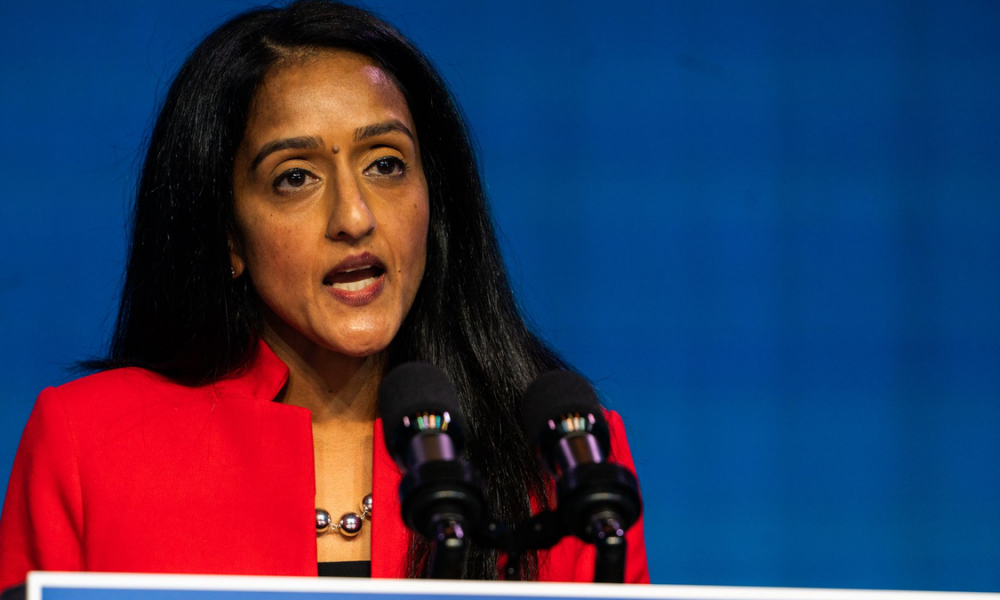Senate confirmed Vanita Gupta as Associate Attorney General, the third highest-ranking official at the Justice Department, on Wednesday. Politicians voted for Gupta with a 51-49 majority.
What We Know:
- Despite conservative activists believing she is someone who has built consensus across the “political divide” in criminal justice reform, many Republicans opposed her nomination. Senate Minority Leader Mitch McConnell (R-KY) argued Gupta has “repeatedly amplified left-wing fear-mongering toward judicial nominees and sitting federal judges.” McConnell also accused Gupta of using “the loosest possible interpretation” of her oath and in delivering her testimony during her confirmation process. In addition, he claimed her reputation greatly contrasts with Attorney Merrick Garland’s, whom he voted to confirm.
- Other prominent Republicans that fought her nomination were Sen. Ted Cruz (R-TX), Sen. Chuck Grassley (R-IA), and Sen. Tom Cotton (R-AR). Cruz compared her to “an extreme partisan advocate” and “an ideologue.” Grassley complained Gupta’s Twitter feed painted Republicans with “a broad brush.” He also did not like that she described the Republican National Convention (RNC) as three nights of racism, xenophobia, and lies on Twitter. Cotton accused Gupta of supporting the decriminalization of drugs. He continued to say she misled the committee on the issue, referencing a 2012 op-ed. In the article, she implied that states should legalize simple possession of all drugs, particularly marijuana. She asked officials to do the same for small amounts of other drugs.
- Axios reports that GOP committee members interrogated Gupta on past tweets and comments that criticized Republicans and former President Donald Trump. Among the tweet mentioned previously, Gupta also admonished Sen. Susan Collins (R-ME) for supporting Brett Kavanaugh’s appointment to the Supreme Court on social media. She mentioned doing so sent a “dangerous message.” After the questioning, Gupta apologized during her confirmation hearing for any past “harsh rhetoric” used against GOP leaders on Twitter.
- Furthermore, Republicans revealed outrage at her statement that everyone has implicit and racial biases. The New Republic writes that Grand Old Party (GOP) officials expressed anger at her claims as an attempt to use Gupta’s effort “to universalize these problems beyond white people against her.”
- Gupta’s confirmation comes almost a month after the Senate Judiciary Committee had a 50-50 evenly divided Senate. Because of this, Senate had to vote to bring the nomination to the Senate floor last week. Senate Majority Leader Chuck Schumer (D-NY) took procedures to ensure this decision. When the Senate met on Wednesday, Vice President Kamala Harris prepared in case she was needed to break the tie. However, her vote was unnecessary.
- Sen. Lisa Murkowski (R-AK), a moderate Republican, was the sole GOP member to back Gupta’s nomination. Murkowski explained her endorsement on the Senate floor. Although Gupta has made “troubling and concerning” remarks, Murkowski believes Gupta has been deeply committed to ensuring justice throughout her career.
- Democratic figures fought for Gupta’s nomination. Schumer said as Associate Attorney General, Gupta will bring a “long overdue perspective” to the department. He also referenced her first case after law school in which she won the release of wrongfully convicted African-Americans, White, and Latino people. He did this to give politicians “a sense” of her commitment to civil rights and racial equity. Prior to the hearing, President Joe Biden cited his nomination in a Tuesday speech after Derek Chauvin’s verdict. He mentioned Gupta and Kristen Clarke, another nominee, would “root out unconstitutional policing and reform our criminal justice system.” Once Gupta won, he congratulated her on Twitter. In that same tweet, he also urged Senate to confirm Clarke to lead the Justice Department’s civil rights division.
“Both are eminently qualified, highly respected lawyers who are dedicated to advancing racial equity and justice,” he wrote.
- Before her nomination, Gupta fought as a civil rights attorney for several groups. These include the National Association for the Advancement of Colored People (NAACP) Legal Defense Fund, the American Civil Liberties Union (ACLU), and the Leadership Conference on Civil and Human Rights. She went on to lead the Justice Department’s civil rights division during the Obama Administration.
In addition to her achievements, Gupta is the first woman of color and civil rights attorney chosen for the position. Gupta’s nomination reaffirms the necessity for new voices and perspectives in our government.



